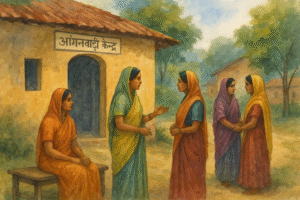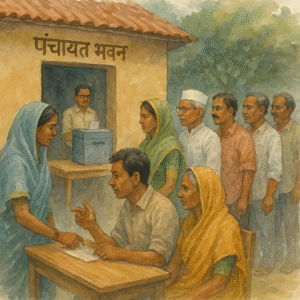Simplified Explanation of the Judgment
This judgment by the Patna High Court relates to two criminal writ petitions filed by foreign nationals who were staying in Bihar during the COVID-19 lockdown. The petitioners included citizens of Bangladesh, Malaysia, and Australia, most of whom had entered India on valid tourist visas. They had traveled to different religious centers, including the Nizamuddin Markaz in Delhi and then moved to Bihar, where they were staying in local mosques (Markaz) in Araria district.
The controversy began after nationwide COVID-19 restrictions were enforced in March 2020, and foreign visitors associated with the Tablighi Jamaat came under scrutiny. In both cases, the foreign nationals were accused under Sections 14 and 14-C of the Foreigners Act, 1946. The allegations were two-fold:
- They did not inform the local police about their presence.
- They were allegedly involved in preaching religious ideologies, which is not permitted under a tourist visa.
The petitioners contended that:
- They had been screened and quarantined as per government norms.
- They were not involved in any preaching activity.
- The Visa terms only prohibited employment or visiting restricted areas, and not visiting religious places or attending religious discourses.
- There was no evidence of preaching, pamphlet distribution, or any public address.
- Mosques and Markaz do not fall under the definition of “hotels,” so the responsibility to report foreign guests did not apply.
The Union of India argued that:
- Tourist visa holders are not allowed to engage in Tablighi activities.
- The management of religious places must report the stay of foreign nationals.
- There is a government policy prohibiting preaching on tourist visas.
The State Government supported the FIRs, claiming they were filed under clear instructions from the Ministry of Home Affairs.
The High Court, however, held that:
- There was no direct evidence that the foreign nationals were involved in preaching.
- No religious material, pamphlets, or recordings were seized.
- The foreigners were stranded due to the lockdown and stayed indoors as per government advisory.
- They complied with health and quarantine guidelines.
- The allegations were vague and did not make out a prima facie offence.
As such, the Court quashed both FIRs, all related chargesheets, and the orders taking cognizance. It observed that continuing prosecution in such cases would be an abuse of the legal process.
Significance or Implication of the Judgment
This decision has significant implications for how legal enforcement should respond to extraordinary humanitarian crises like pandemics. Key takeaways include:
- Mere presence in a religious place during lockdown does not amount to visa violation.
- Legal actions must be based on solid evidence, not assumptions or generalized policies.
- Government authorities must ensure fair treatment of foreign nationals, especially during emergencies.
- Courts can and will protect individual rights against arbitrary or mechanical application of law.
Legal Issue(s) Decided and the Court’s Decision with reasoning (Bullets)
- Whether staying in a mosque during lockdown amounts to visa violation:
- ❌ No. The stay was due to lockdown. There was no restriction on visiting religious places.
- Whether the petitioners preached religious ideologies:
- ❌ No. No materials or evidence of preaching were found.
- Whether non-reporting of stay to local police is a violation:
- ❌ No. Foreigners staying under 180 days need not register. Mosques are not “hotels” under law.
- Whether charges under Sections 14 and 14-C of Foreigners Act were valid:
- ❌ No. There was no specific act violating visa conditions or aiding such violations.
- Whether continued prosecution would be lawful:
- ✅ No. The Court held it to be abuse of process.
Judgments Referred by Parties
- State of Haryana vs. Bhajan Lal, 1992 Supp (1) SCC 335
- Anand Kumar Mohatta vs. State (Govt. of NCT Delhi), AIR 2019 SC 210
- Konan Kodio Ganstone & Ors. vs. State of Maharashtra (Bombay HC, Cri. W.P. No. 548/2020)
- Hla Shwe & Ors. vs. State of Maharashtra (Nagpur Bench, Bombay HC)
- Kalyez Chingiz vs. State of Karnataka (Cr. Petition No. 200658/2020)
- Farhan Hussain vs. State of Karnataka (Cr. Petition No. 2376/2020)
Judgments Relied Upon or Cited by Court
- Same as above; extensive reliance on Bombay and Karnataka High Court rulings.
Case Title
Md. Enamul Hasan & Ors. v. Union of India & Ors.
With
Md. Rizwan Alam & Ors. v. Union of India & Ors.
Case Number
Criminal Writ Jurisdiction Case No. 367 of 2020
With
Criminal Writ Jurisdiction Case No. 369 of 2020
Citation(s)
2021(1)PLJR 178
Coram and Names of Judges
Hon’ble Mr. Justice Rajeev Ranjan Prasad
Names of Advocates and who they appeared for
- Mr. P.K. Shahi, Sr. Advocate with Mr. Alok Ranjan & Mr. Majid Mahboob Khan — for the petitioners
- Dr. K.N. Singh, Additional Solicitor General — for Union of India
- Dr. Anjani Kumar, AAG 4 with Mr. Alok Kumar Rahi — for the State of Bihar
Link to Judgment
https://patnahighcourt.gov.in/viewjudgment/MTYjMzY3IzIwMjAjMSNO-enwFHBCpRwQ=
If you found this explanation helpful and wish to stay informed about how legal developments may affect your rights in Bihar, you may consider following Samvida Law Associates for more updates.








